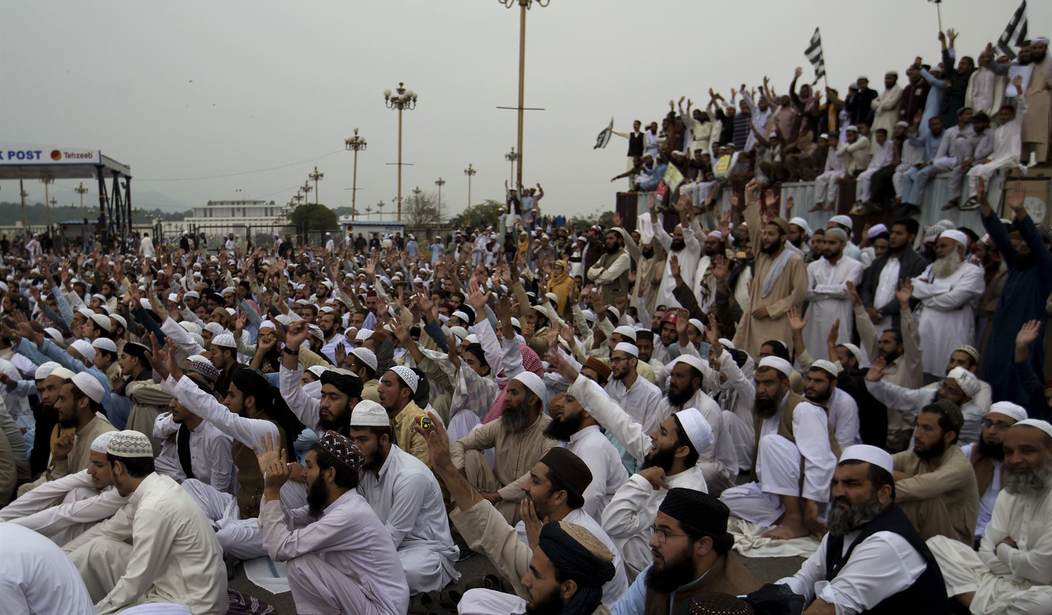A Christian girl in Pakistan who, in June, escaped the Muslim who kidnapped her said he forcibly converted her to Islam and repeatedly sexually assaulted her as his “wife.”
Muskan Liaqat was 14 years old when she was kidnapped at gunpoint from her home in Muridke, Sheikhupura District, by Muhammad Adnan and his father Muhammad Arif on the night of May 24, 2023. The incident occurred as her family slept, she said.
“They took me to their home, where they tortured me and forcibly took my thumb impressions on some papers – I was later told that I had become a Muslim and Adnan was my husband,” Muskan told Christian Daily International-Morning Star News.
Muskan said she was treated as a sex slave. “I was raped and beaten by Adnan with an iron rod on almost a daily basis,” she said. “He used to call me ‘Chuhri’ [a pejorative term used for Christians] and other curse words. As a result of repeated sexual abuse, I got pregnant in 2024.”
Severe torture by Adnan resulted in a miscarriage in the fourth month of her pregnancy, Muskan said. After about two years in captivity, on June 3, Muskan finally managed to escape when Adnan left her unguarded at his house.
The abduction and forced marriage of both Christian and Hindu children and women are not just a threat. They are a very sad reality across Pakistan.
“I had three daughters. He took all of them. And my only son.”
These aren't the words of a woman at war. They are the pleas of a Hindu mother in Shahdadpur, Sindh, a Pakistani province where being born as a minority can mean being robbed of your child, your faith, and your future.
On June 19, four Hindu children, Jiya (22), Diya (20), Disha (16), and Ganesh Kumar (14), were abducted from their home in Shahdadpur, Sanghar District of Pakistan, according to the Global Forum of Communities Discriminated on Work and Descent (GFoD). Within 48 hours, videos began to circulate online showing them reciting the Kalma (Islamic prayers). Their names were changed in the video.
Their identities erased. Their supposed “conversion” to Islam was celebrated by religious hardliners as a victory, while the family and the wider Hindu community were left devastated.
"This isn't just an individual case, it is a continuation of an unchecked crisis: the abduction, forced conversion, and exploitation of minority girls and boys in Pakistan."
According to the Movement for Solidarity and Peace, every year up to 1,000 young Christian and Hindu girls and young women are abducted by Muslim men. They are often aged between 12 and 25. Many families never see their girls again. The state authorities rarely take meaningful action to bring perpetrators to justice, and police are often biased, refusing to file reports submitted by the victims or their families.
For the small minority of victims who escape or are recovered, the shame of abduction and rape places a huge shadow over their lives within Pakistan’s honor-based culture, with girl survivors of abduction showing higher rates of post-traumatic stress disorder, anxiety, depression, and detachment, according to the human rights organization, Jubilee Campaign.
The human rights organization, Open Doors, reports that the number of Christian, Hindu (and other minority religions) girls being abducted, abused, and forcefully converted to Islam in Pakistan is increasing. On August 9, 2024, for instance, a 12-year-old Christian girl was abducted, forcibly converted, and married to a Muslim.
Another example is a 10-year-old girl from Faisalabad who was kidnapped on Feb. 12, 2024. Another 13-year-old girl from Multan was kidnapped on March 13, 2024, and a 15-year-old girl from Tando Ghulam Ali town in Badin district, Sindh province, went missing on March 11, 2024.
The psychological trauma and abuse continue even if a case is brought to rescue the victims. The legal system repeatedly fails these children and young women. Even efforts to protect underage girls belonging to minority religions are hindered. Often, the lower courts simply follow the claims made by the perpetrators about the victim's age and free will. Many victims are forced to say they are over 18 years old or that they have converted voluntarily.
It is reported that in many cases, minority girls are forcibly married to men who are twice their age or more and who are already married with children near the victim's age.
The challenges involved represent a huge emotional strain for the families who constantly fear retribution from the perpetrators and their supporters, as well as the reality that for most victims, a “return to her family is near impossible”.
Christian and Hindu parents are thus getting increasingly fearful of letting their daughters walk outside alone. Islamic religious leaders support perpetrators and enjoy de facto impunity for their actions.
Meanwhile, all parliamentary efforts to protect religious minorities from forced conversions have failed. Likewise, some Islamic religious leaders are helping men to kidnap, rape, and forcibly convert young girls below the age of consent by providing "marriage certificates." Increasingly, new quasi-government "advisory bodies" to the state are completely made up of religious (Islamic) scholars who direct and influence the government and laws.
Pakistan has a long history of corruption. It is largely driven by the army but has multiple other drivers. One of the ways in which crime cartels act as drivers is through human trafficking. Hundreds of poor Pakistani Christian girls, for instance, have been trafficked to China in a market for "brides," according to Associated Press.
“Most abduction cases do not get media coverage, and the victims suffer in silence," Open Doors notes.
Minority women and girls are also at risk of honor killings and blasphemy allegations. It is estimated that around 1,000 women are killed in so-called honor killings in Pakistan every year, including the case of 24-year-old Sonia, from Rawalpindi, who was fatally shot by a Muslim man for refusing to marry him.
Despite all challenges, minority citizens of Pakistan are raising their voices. On August 10, in the city of Karachi, Christian rights advocate Luke Victor told a rally that Pakistan has been officially observing August 11 as National Minorities Day since 2009. Nevertheless, minority communities still face discrimination, the denial of basic facilities, and forced religious conversions.
“Even after 78 years of independence, we don’t feel free because our young daughters are forcefully converted and married off, because our children don’t get equal chances and because we are looked down upon,” Victor said.
At the Lahore Press Club forum, Katherine Sapna of the legal group Christians’ True Spirit called for comprehensive and effective legislation to criminalize forced faith conversions of girls and boys belonging to Christian and Hindu communities.
In Karachi, a large number of people belonging to various minority groups participated in a Minorities Rights March on the same day. They demanded a minimum 10 percent quota for minority students in all educational institutions, removal of discriminatory content from textbooks, constitutional recognition of minorities’ distinct identity, protection of places of worship and properties, criminalization of forced conversions, amendments to personal laws and revision of Articles 41 and 91 of the Constitution to allow minorities to run for the offices of president and prime minister.
They also sought greater political representation at the federal, provincial, and district levels, measures for economic empowerment, protection against misuse of religious laws, and inclusion of minorities in policymaking.
Meanwhile, Pakistan is experiencing an increasingly Islamicized culture and is home to a plethora of radical Islamic groups, which also target religious minorities. These Islamist groups vary in size, names, and influence, and they often split, merge, and reappear. Religious minorities in the country feel increasingly trapped between these radical groups, the Islamic culture of Pakistani society, and a government appeasing these groups.
Open Doors notes that the Islamists who adopt the caliphate ideology and mistreatment of "infidels/kafirs" seem to have the strongest voice in society. They firmly identify themselves with supporters of the Islamic State (ISIS) and the Taliban, which have received a strong boost from the events in neighboring Afghanistan.
The U.S. government's dealings with Pakistan should thus be conditional upon Pakistan's improvement of minority rights and its fight against Islamic terrorism. What kind of punishment is appropriate for those who abuse minorities or who take no effective action against radical Islamic terror groups? In such cases, there should be no aid nor economic incentives. Otherwise, the U.S. is just feeding another radical Islamic regime in Pakistan, hoping it will eat the West alive last.
Editor's Note: The Deep State is working overtime to subvert President Trump's agenda and the will of the people.
Help PJ Media continue to tell the truth about the efforts of unelected career government officials working against the American people. Join PJ Media VIP and use promo code FIGHT to get 60% off your membership.










Join the conversation as a VIP Member